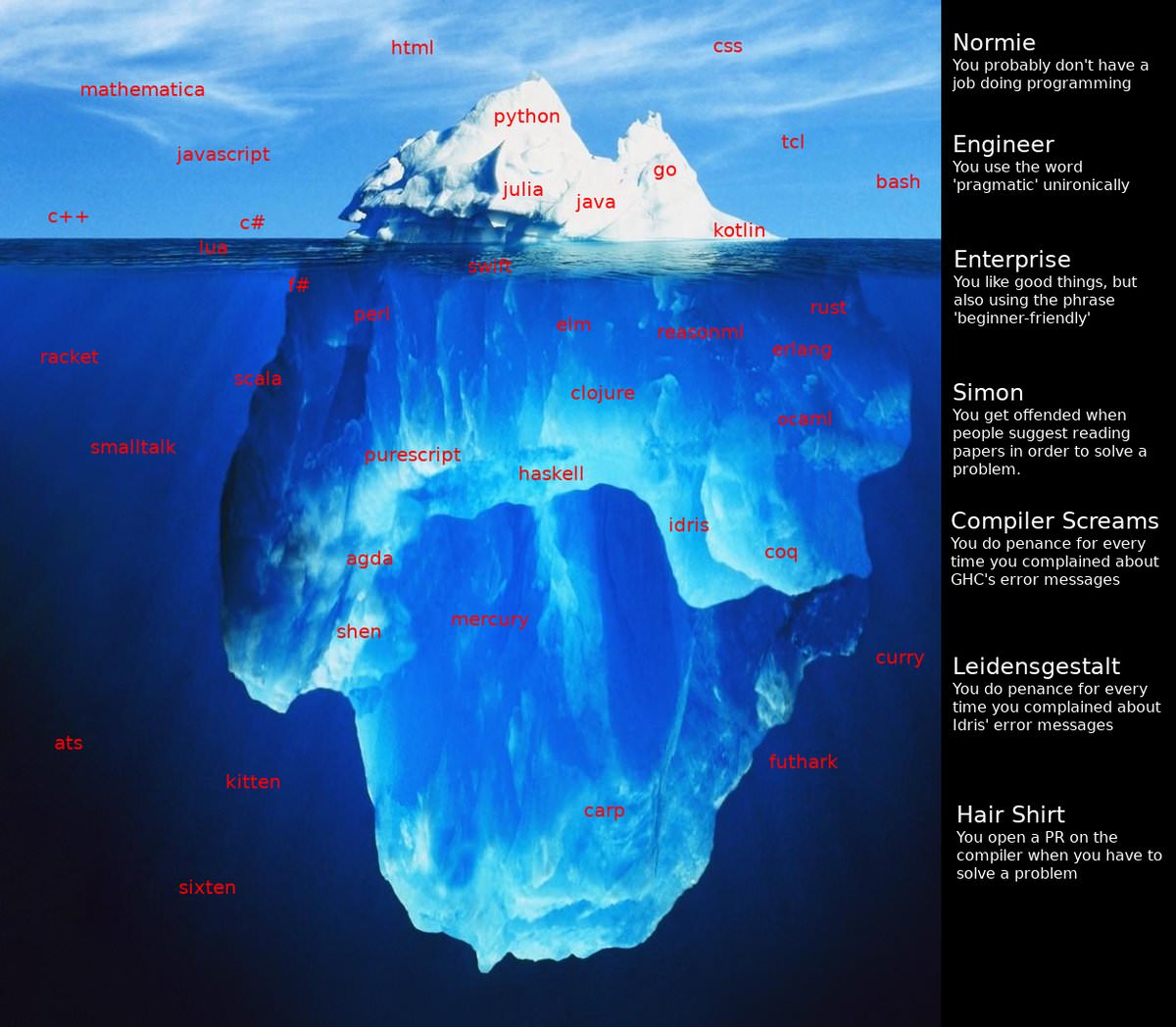Notes on Programming as a practice. Collect notes about programming language at the “language” level without getting into specific details of each language. “on”, “about”, “of” programming.
The Myth of the Coder “Considering the historical distinction between coder and programmer” – Communications of the ACM, Aug 2024.
List of Tips | The Pragmatic Bookshelf — Extracted From The Pragmatic Programmer
norvig/pytudes: Python programs to practice or demonstrate skills.
My list of challenging software projects some programmers should try | andreinc; 2024.
Papers
Books
- Nature of Code by Daniel Shiffman. “an online resource and print book exploring the unpredictable evolutionary and emergent properties of nature in software via the creative coding framework processing.”
2024 version with a new and rebooted version of this book built around javascript and the
p5.jslibrary. The book has a few new coding tricks this time, but it’s the same old nature—birds still flap their wings, and apples still fall on our heads.
The discussions on naming and abstraction are particularly illuminating, exposing some fundamental tradeoffs like synthetic vs natural names, or principled vs adaptable systems of abstractions. Were these notions more widespread, a lot of the pointless rants and debates we hear in programming circles would disappear.
I would not recommend this book to beginners - this book is most useful when you are experienced enough that your struggle is to make choices, not to get things to work. — HN
- (Van Roy & Haridi, 2004)
- (Abelson & Sussman, 1996)
- Programming Languages: Application and Interpretation — (Krishnamurthi, 2007)
- How to Design Programs — (Felleisen, 2001)
- free-programming-books/free-programming-books.md at master · EbookFoundation/free-programming-books
Courses
- 15-112 Fundamentals of programming and computer science (F2013)
- 15-122 Principles of Imperative
Computation (F2010)
- [prereq:15-112]
- 15-210 Parallel and Sequential Data Structures and Algorithms
- 15-212 Principles of Programming
- 15-213 Introduction to computer systems (2010)
- 15-312 Foundations of Programming Langauges taught by Frank Pfenning — [prereq: 15-212]
-
CS312 - Data structures and functional programming
- Spring 2008, Cornell CS
- Uses SML/NJ.
- PS5 implements a mini-ML compiler. source included.
- Programming Language Concepts for Software Developers by Peter Sestoft, 2010; uses F#.
- CAS 761: Generative Programming
Other lists
- 620 Free Online Programming & Computer Science Courses You Can Choose from to Kick Off 2020; Jan 2020
Journals
Papers
Rosetta Code Analysis (Nanz & Furia, 2014)
Our statistical analysis reveals, most notably, that: functional and scripting languages are more concise than procedural and object-oriented languages; C is hard to beat when it comes to raw speed on large inputs, but performance differences over inputs of moderate size are less pronounced and allow even interpreted languages to be competitive; compiled strongly-typed languages, where more defects can be caught at compile time, are less prone to runtime failures than interpreted or weakly-typed languages.
- Planning the Software Industrial Revolution by Brad J Cox.
Blogs
Tools
- Python Tutor - Visualize Python, Java, JavaScript, TypeScript, Ruby, C, and C++ code execution
- The Language Server protocol
… is used between a tool (the client) and a language smartness provider (the server) to integrate features like auto complete, go to definition, find all references and alike into the tool
- Trinket — “lets you run and write code in any browser, on any device. Trinkets work instantly, with no need to log in, download plugins, or install software. Easily share or embed the code with your changes when you’re done.”
Tutorials
- PCITRW (Programming Concepts in the Real World) — tutorial on github.
- Developer Roadmaps - roadmap.sh — visual maps of learning plans. eg: DBA Roadmap: Learn to become a database administrator with PostgreSQL
Projects
practical-tutorials/project-based-learning: Curated list of project-based tutorials
Videos
Articles
- A Bunch of Programming Advice I’d Give To Myself 15 Years Ago by Marcus Buffett.
- 12 resolutions for programmers
- Perhaps Not The Answer You Were Expecting But You Asked For It (An Accidental Blook) by Connor McBride.
- Mastering Programming by Kent Beck.
- Rubber Ducking: The Various Kinds of IO - Blocking, Non-blocking, Multiplexed and Async.
- Imaginary problems, the root of bad software – George – Medium
- Learn your standard library – Letters To A New Developer
- The Grug Brained Developer — grug brain developer not so smart, but grug brain developer program many long year and learn some things although mostly still confused
Concepts
Delimited continuation
- deech: “@mattgreenrocks and @andywingo One of my favorite abstractions! https://t.co/Oo42zSIxX8”
- guile and delimited continuations — wingolog
- growing fibers — wingolog
- Continuations and delimited control
Misc
Aphorisms on programming language design
 — via
— via
- More Good Programming Quotes | Henrik Warne’s blog
- More Good Programming Quotes, Part 2 | Henrik Warne’s blog
- More Good Programming Quotes, Part 3 | Henrik Warne’s blog
Links
- Avanier.now.sh
- PLT metalist by Steven Shaw
- sdmg15/Best-websites-a-programmer-should-visit: Some useful websites for programmers. *charlax/professional-programming: A collection of full-stack resources for programmers.
- romenrg/evergreen-skills-developers - “List of evergreen skills that should serve as a fair assessment of software developers / engineers; as opposed to framework trends”
See also: literate, pl, programming-aphorisms